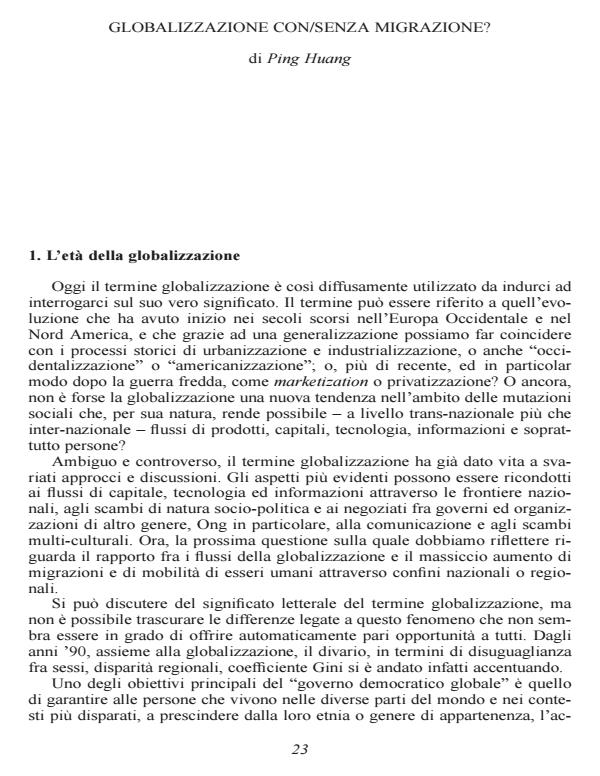Globalizzazione con/senza migrazione?
Titolo Rivista SOCIOLOGIA DELLA COMUNICAZIONE
Autori/Curatori Ping Huang
Anno di pubblicazione 2005 Fascicolo 2005/37 Lingua Italiano
Numero pagine 12 P. Dimensione file 43 KB
DOI
Il DOI è il codice a barre della proprietà intellettuale: per saperne di più
clicca qui
Qui sotto puoi vedere in anteprima la prima pagina di questo articolo.
Se questo articolo ti interessa, lo puoi acquistare (e scaricare in formato pdf) seguendo le facili indicazioni per acquistare il download credit. Acquista Download Credits per scaricare questo Articolo in formato PDF

FrancoAngeli è membro della Publishers International Linking Association, Inc (PILA)associazione indipendente e non profit per facilitare (attraverso i servizi tecnologici implementati da CrossRef.org) l’accesso degli studiosi ai contenuti digitali nelle pubblicazioni professionali e scientifiche
The term globalization has to be referred to a new trend of social transformation which enables trans-national flows of products, capital, technology, information, and above all, people. So this paper deals with a study of labour migration in Southeast Asia, in terms of its social and political impacts. For example internal labour migration is protruding in China and India, while in the Philippines, Thailand, Malaysia, Korea and Japan, due to the differences in the size of the countries and population, the trend for internal migration is not evident. Generally speaking, poverty, either caused by natural disasters or by unbalanced policies, is the firstly notable reason that causes migration. Reasons that some certain country or region accepts the immigrants are different. Some countries such as Japan, Korea and Malaysia accept immigrants mainly for worker personnel. Illegal or undocumented migration is a common problem. Concerning the issue of undocumented migration, the Philippines, India, China, Thailand and Malaysia have traditional migration routes that are still active. On the other hand, it is more difficult to enter into Japan and Korea illegally. Undocumented migrants are unwilling to access public services unless it is absolutely necessary for fear of being identified, detained and deported. What’s more, they are discriminated by the locales and the mass media. Overall, both cross-border and internal migration provides benefits to the migrants, the sending countries and the receiving countries thus the general consensus is that all forms of migration will remain circular, temporary or permanent depending on the situation. Thus, the best way to address the issue is to determine innovative measures and policies for the integration of migrants and reintegration of returnees into the local society and to encourage local societies to be more receptive to the presence of migrants.;
Ping Huang, Globalizzazione con/senza migrazione? in "SOCIOLOGIA DELLA COMUNICAZIONE " 37/2005, pp , DOI: